Great Expectations:Important Quotations - Year 9 PDF Download
- Importance of Textual References and Quotations
- Assessment objectives emphasize the use of textual references, including quotations, to showcase understanding.
- Diverse methods like summarizing, paraphrasing, referencing single words, and plot events are equally valid.
- Both referencing the text and directly quoting from it are crucial to demonstrate comprehension.
- Quality of Text Knowledge
- Emphasize gaining a deep understanding of the text over memorizing specific quotations.
- Strong knowledge aids in effectively selecting references to respond to questions.
- Guilt and Shame
- Guilt and Shame in Literature: In literary works, the themes of guilt and shame often revolve around characters' internal struggles with remorse and self-blame. These emotions can stem from various actions or events within the narrative.
- Examples from Literature:
- Macbeth by William Shakespeare: Macbeth's overwhelming guilt after murdering King Duncan drives him to madness and eventual downfall.
- The Scarlet Letter by Nathaniel Hawthorne: Hester Prynne's shame over her public condemnation for adultery shapes her interactions with society and her own self-perception.
- Social Class
- Social Class Dynamics: Social class explores the hierarchical divisions within society based on economic, educational, or occupational factors. It often influences characters' opportunities, behaviors, and perceptions in literature.
- Illustration in Literature:
- Great Expectations by Charles Dickens: The novel portrays the stark differences between social classes through characters like Pip, who navigates various class structures and their implications.
- Pride and Prejudice by Jane Austen: Austen critiques the rigid social hierarchy of her time, highlighting the impact of class on relationships and individual choices.
- Ambition and Self-improvement
- Ambition in Narratives: Ambition and the pursuit of self-improvement are common themes in literature, driving characters to achieve goals, overcome obstacles, and evolve throughout the story.
- Instances from Literary Works:
- Frankenstein by Mary Shelley: Victor Frankenstein's ambitious quest for scientific knowledge leads to tragic consequences, exploring the dangers of unchecked ambition.
- The Great Gatsby by F. Scott Fitzgerald: Jay Gatsby's relentless pursuit of wealth and status reflects the theme of ambition and its impact on personal relationships and morality.
- Integrity and Reputation
- Integrity and Reputation in Literature: Themes of integrity and reputation delve into characters' moral values, principles, and how they are perceived by others in the narrative.
- Exemplification through Texts:
- To Kill a Mockingbird by Harper Lee: Atticus Finch's unwavering integrity in defending Tom Robinson illustrates the importance of moral principles despite societal pressures.
- Othello by William Shakespeare: Iago's manipulation of Othello's reputation showcases how integrity can be tarnished and exploited for nefarious purposes.
Analysis of Guilt and Shame in Great Expectations
- Guilt as a Dominant Theme: Guilt holds a significant position in Charles Dickens' novel, Great Expectations, shaping the life of the protagonist, Pip. Dickens strategically weaves guilt into Pip's narrative to illustrate the profound impact of his environment on his personal growth.
- Paired Quotations:
- "The dreadful pledge I was under to commit a larceny on those sheltering premises" - Pip the narrator, Chapter 2
- "What I suffered outside was nothing to what I underwent within" - Pip the narrator, Chapter 4
- Meaning and Context:
- The first quote, found in Chapter 2, captures Pip's moral dilemma as he is coerced into stealing for the convict, Magwitch.
- The second quote, from Chapter 4, highlights Pip's internal turmoil following the incident, contrasting his external actions with his internal emotional strife.
- Analysis:
These paired quotations exemplify Pip's inner conflict and the burden of guilt he carries. In Chapter 2, Pip's forced involvement in criminal activities marks the beginning of his moral struggle. The act of stealing not only challenges his sense of right and wrong but also foreshadows the internal turmoil he will face.
In Chapter 4, Pip's realization of the emotional toll of his actions reflects a deeper, psychological impact. Despite the physical hardships he endures, it is the weight of his conscience that truly torments him. This emotional distress hints at the profound psychological journey Pip will undertake throughout the novel.
Analysis of Guilt and Shame in "Great Expectations"
- Overview:
Within "Great Expectations," Charles Dickens delves into the profound themes of guilt and shame, particularly through the character of Pip, illustrating the internal conflicts and moral dilemmas faced by the protagonist.
- Magwitch's Influence:
Magwitch's coercion of Pip into stealing food and tools from Joe and his sister instills deep fear within the young protagonist, setting the stage for Pip's internal struggles.
- Pip's Moral Conflict:
The promise made to Magwitch leads Pip into a relentless internal moral conflict, a pivotal driving force shaping the initial chapters of the novel.
- Dickens' Portrayal of Pip:
Dickens paints Pip as a principled and virtuous child, torn between his loyalty to Joe and the obligations towards Magwitch, highlighting the inner turmoil faced by the protagonist.
- Continued Impact:
As Pip reflects on his past turmoil and suffering, the enduring feelings of guilt and shame dominate his youth, portraying a lasting impact on his character development.
Quote from "Great Expectations"
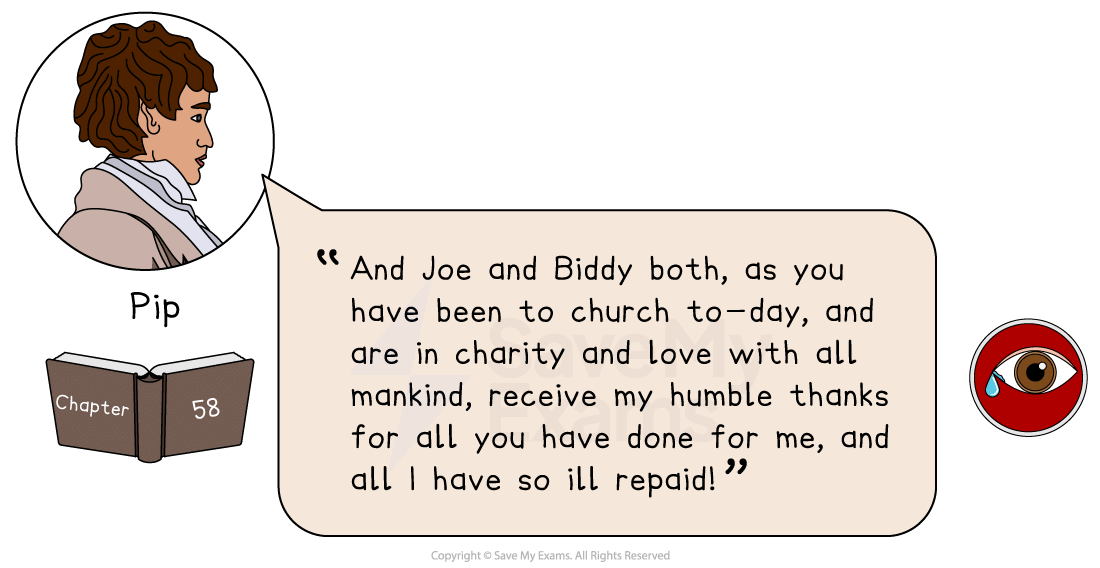
"And Joe and Biddy both, as you have been to church today, and are in charity and love with all mankind, receive my humble thanks for all you have done for me, and all I have so ill repaid!" – Pip, Chapter 58
Meaning and Context
- This quote appears in Chapter 58 of the novel when Pip returns to England and visits Joe and Biddy.
Analysis
In this pivotal moment of the story, Pip expresses deep gratitude towards Joe and Biddy for their unwavering support and love. Let's delve deeper into the significance of this quote:
- Gratitude and Reflection: Pip acknowledges the kindness and selflessness of Joe and Biddy, highlighting themes of gratitude and reflection on his own actions.
- Contrast in Relationships: The contrast between Pip's interactions with Joe and Biddy versus other characters underscores the importance of genuine connections and the value of true friendship.
- Themes of Redemption: Pip's acknowledgment of his shortcomings signifies a moment of redemption and personal growth, emphasizing the novel's themes of forgiveness and self-awareness.
- Symbolism of Charity: The reference to being in "charity and love with all mankind" symbolizes Pip's newfound understanding of the importance of compassion and empathy in human relationships.
Pip's Character Development in Great Expectations
- Pip's idealist tendencies often led him to perceive the world in a simplistic manner, causing him to overlook deeper complexities.
- This tendency to oversimplify situations based on superficial values resulted in his mistreatment of those who cared for him, such as Joe and Biddy.
Recognition of Mistakes and Redemption
- The quote reflects Pip's profound sense of shame and regret for mistreating Joe and Biddy, showcasing his growing awareness of his ingratitude towards them.
- It demonstrates Pip's humility and signifies his complete redemption as a character, highlighting his journey towards self-awareness and personal growth.
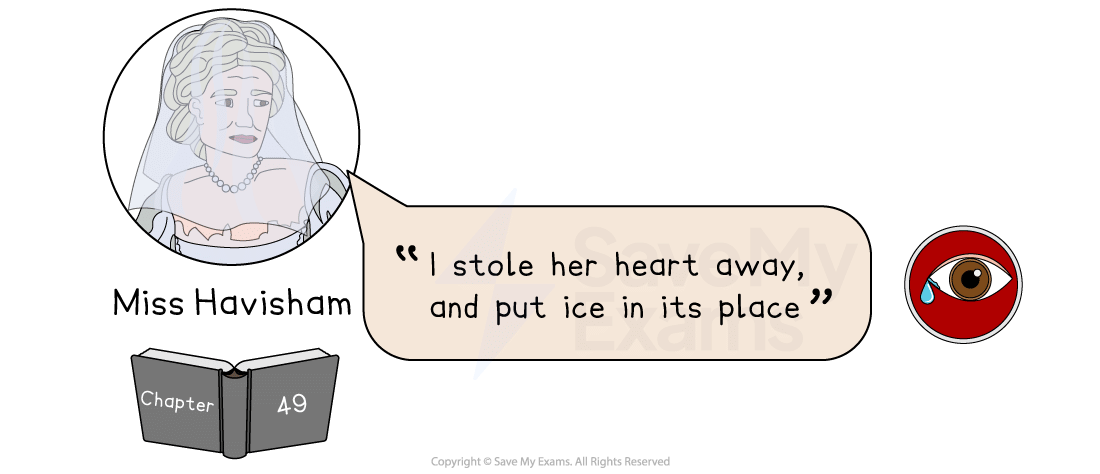
Miss Havisham's Emotional State
“I stole her heart away and put ice in its place” – Miss Havisham, Chapter 49
Meaning and Context
This haunting quote from Miss Havisham encapsulates her emotional turmoil and the impact of her past actions on her psyche.
- Overview of Quote:
- This quote is a poignant reflection by Miss Havisham towards the end of the novel, contemplating her influence on Estella.
- Analysis of Miss Havisham's Remorse:
- Miss Havisham expresses regret for molding Estella to resent men and break their hearts as a form of revenge due to her own heartbreak.
- Realization dawns on Miss Havisham as she acknowledges the harm caused by her actions towards Estella.
- She draws a parallel between the damage inflicted on Pip's heart and her own, highlighting the cycle of pain perpetuated by seeking vengeance.
- This remorse leads Miss Havisham to seek forgiveness from Pip, recognizing the repercussions of her quest for personal retribution.
- Illustrative Explanation:
- Miss Havisham's regret stems from understanding the negative impact of her upbringing on Estella, who was taught to inflict pain as a response to her own suffering.
- This revelation showcases a moment of clarity for Miss Havisham, where she comprehends the destructive nature of perpetuating a cycle of vengeance.
- By acknowledging the shared pain experienced by Pip and herself, Miss Havisham confronts the consequences of her actions, leading to a plea for forgiveness and a desire for redemption.
Analysis of Quote by Estella from "Great Expectations"
Quote Interpretation
- Estella's quote reflects on the transformative power of suffering in shaping one's character and understanding.
Contextual Meaning
- The quote, spoken by Estella to Pip in the final chapter, signifies her personal growth and realization.
Significance of the Quote
- Estella acknowledges that suffering has been her greatest teacher, leading her towards self-awareness and a profound change within herself.
- Through suffering, she has been molded into a better version of herself, indicating resilience and personal evolution.
Application in Real Life
- Similarly, in real life, individuals often find that challenges and hardships can lead to personal growth and a deeper understanding of themselves and others.
- Adversities can break individuals but also have the potential to reshape them into stronger, more empathetic beings.
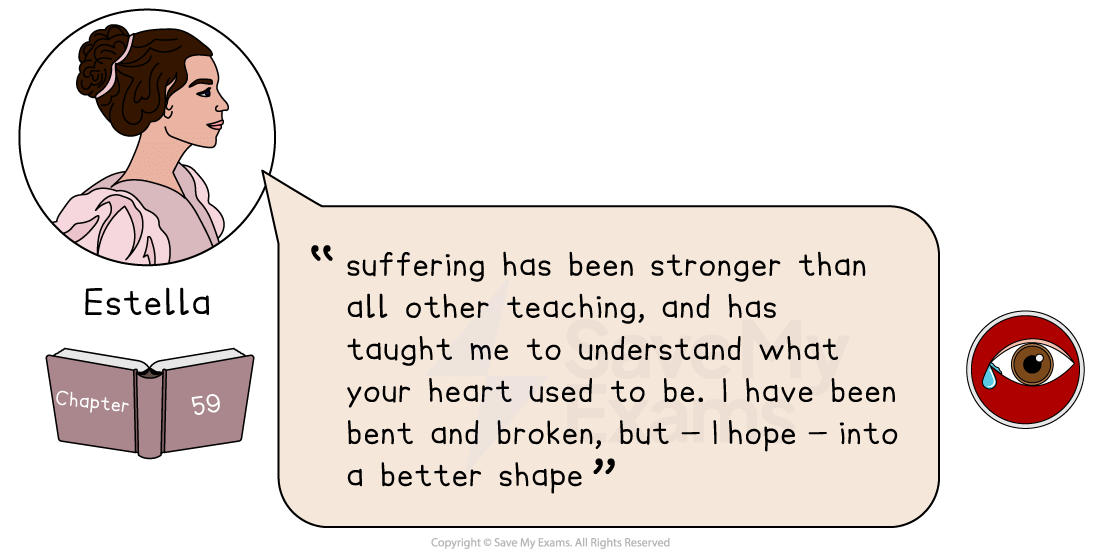
- Estella's Transformation in "Great Expectations"
- Estella undergoes significant personal growth by the end of the novel, primarily influenced by the challenges she faces in her marriage to Drummle.
- Her choice of words such as "bent" and "broken" reflects how Miss Havisham shaped her and how Drummle's treatment shattered her, mirroring Pip's own arduous journey.
- Estella's evolution highlights a newfound ability to recognize and value Pip's affection.
Ambition and Self-Improvement |
|---|
In Charles Dickens' novel "Great Expectations," the core theme revolves around Pip's strong desire for self-improvement. The title itself, "Great Expectations," mirrors Pip's aspirations for a better future and his unwavering belief in the potential for upward social mobility. 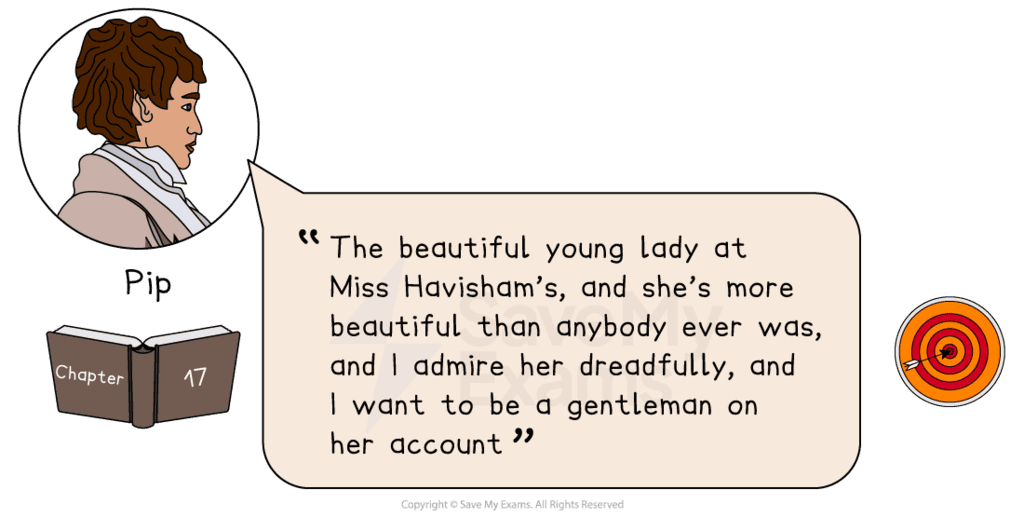 In Chapter 17, Pip expresses his admiration for Estella, saying, "The beautiful young lady at Miss Havisham’s, and she’s more beautiful than anybody ever was, and I admire her dreadfully, and I want to be a gentleman on her account."
Pip's yearning for self-improvement is not solely driven by personal ambition but also by his infatuation with Estella, fueling his desire to better himself to be worthy of her. |
- Character Analysis of Pip in "Great Expectations"
- Pip's Moral Code and Romantic Idealism
- One of Pip's defining characteristics is his strong moral code, which is evident in his actions throughout the story. Additionally, the quote highlights another facet of his personality—his romantic idealism.
- Aspirations for Self-Improvement and Social Advancement
- Pip harbors deep aspirations to elevate his education and social status. His ultimate goal is to enhance his position in society to win the affection of Estella, whom he admires for her beauty and grace.
- Pip's Moral Code and Romantic Idealism
- Analysis of Quoted Passage - Chapter 17
- Reflection on Discontent and Disillusionment
- The quote, "I am not at all happy as I am. I am disgusted with my calling and with my life" from Chapter 17, encapsulates Pip's profound dissatisfaction with his current circumstances.
- Reflection on Discontent and Disillusionment
- Meaning and Context
- The passage signifies Pip's discontentment with his present state, indicating a sense of disillusionment with his occupation and life trajectory.
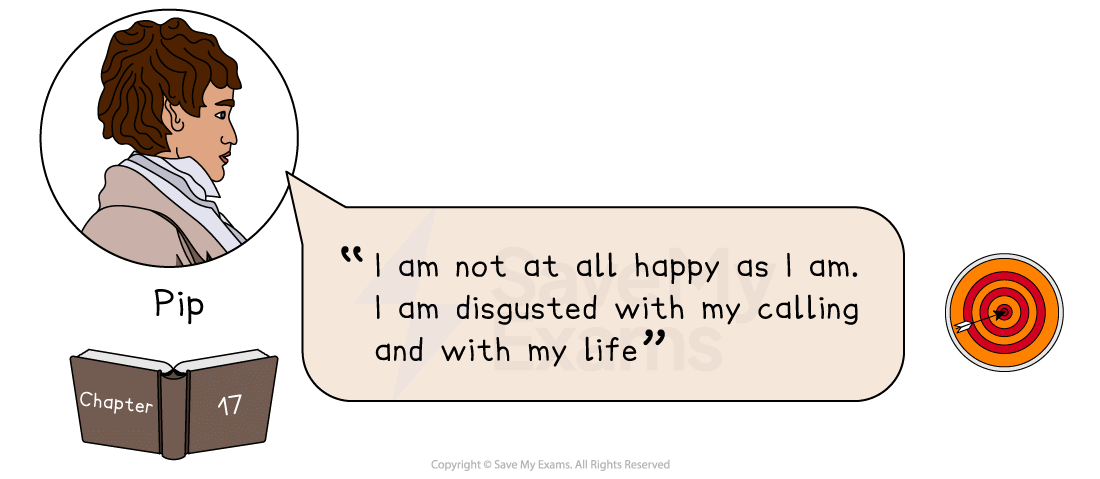
Analysis of Pip's Quote from Chapter 17
Pip's dialogue in Chapter 17 with Biddy sheds light on his inner turmoil and aspirations.
- Pip expresses a deep sense of self-pity concerning his life and feels uncertain about his social status and future prospects.
- He confides in Biddy regarding his dissatisfaction and his dream of attaining a higher social standing as a gentleman.
- Charles Dickens strategically employs Biddy in this narrative to probe whether Pip's ambition is solely to impress Estella, revealing Pip's intense desire to break away from his dreary existence in the marshes.
- Despite Biddy's attempts to question Pip's motivations and offer guidance, Pip remains fixated on his personal ambitions.
Elaboration and Examples
In this section of the novel, Pip's conversation with Biddy unveils his complex emotions and desires:
- Pip's self-pity reflects his dissatisfaction with his current circumstances, highlighting his internal struggles and quest for a better life.
- His yearning to become a gentleman symbolizes his aspiration for social mobility and a transformation in his identity.
- Biddy's role as an interlocutor signifies the conflict between Pip's genuine aspirations and potential external influences, such as his infatuation with Estella.
- By showcasing Pip's reluctance to heed Biddy's advice, Dickens underscores Pip's single-minded pursuit of his ambitions, potentially at the cost of valuable guidance.
Significance of the Quote
Pip's dialogue with Biddy in Chapter 17 serves as a pivotal moment in the novel, highlighting themes of ambition, social class, and personal growth:
- It showcases Pip's internal struggles and dissatisfaction, setting the stage for his character development throughout the narrative.
- The conversation with Biddy offers insight into Pip's motivations and the complexities of his aspirations, adding depth to his character.
- Through Pip's interaction with Biddy, Dickens invites readers to ponder the nature of ambition, social expectations, and the pursuit of personal fulfillment.
Analysis of Quotation from "Great Expectations"
- This quote is from Chapter 22 of "Great Expectations" and is spoken by the character Herbert in a conversation with Pip.
Meaning and Context
- The statement portrays a negative image of a girl, emphasizing her harsh, proud, and whimsical nature.
- It suggests that the girl has been raised by Miss Havisham with the intention of seeking revenge on all males.
- Herbert's words reveal his perception of the girl's character and upbringing, hinting at underlying motives and influences.
Analysis
- The quote underscores the theme of revenge and manipulation present in the novel, showcasing how characters are shaped by their environments.
- It highlights the impact of upbringing on individual behavior, indicating how Miss Havisham's influence has molded the girl's personality.
- This observation by Herbert sheds light on the complexities of relationships and the effects of past experiences on present actions.
- The statement invites readers to contemplate the deeper layers of the characters' motivations and the consequences of their actions within the narrative.
- Herbert's Cautionary Advice on Pursuing Estella
- Herbert endeavors to caution Pip about the perils of pursuing Estella, aiming to shed light on the potential pitfalls of such a pursuit.
- He intentionally employs the term "haughty" to depict Estella's arrogance and disdain, while using "capricious" to underscore her unpredictable nature.
- These carefully chosen words not only reflect Estella's character traits but also serve as a warning to Pip regarding the challenges he may face in his pursuit of her.
- Miss Havisham's Influence on Estella's Fate
- The quote unveils Miss Havisham's own ambitious and cruel designs for Estella, ultimately resulting in tragic consequences.
- Miss Havisham's manipulation and molding of Estella reflect a darker side of her character, leading to a chain of events with profound and devastating outcomes.
Social Class in Great Expectations
- Dickens thoroughly examines the class structure of Victorian England in his novel Great Expectations, using it to underscore the primary moral theme of the story.
Key Quote Analysis
In Chapter 9, Pip, the narrator, reflects on the perceived social divide between himself and Joe:
“I thought long after I laid me down, how common Estella would consider Joe, a mere blacksmith: how thick his boots, and how coarse his hands”
Interpretation and Context
Pip's contemplation highlights the deep-rooted societal distinctions and prejudices of the time. The quote showcases Pip's awareness of class disparities and his concern about how his loved ones are perceived by others.
Significance of the Quote
This moment is pivotal in demonstrating Pip's internal struggle with social status and the impact it has on his relationships and self-perception.
Character Development
Through this reflection, Dickens effectively portrays Pip's evolving understanding of social class and his aspirations to rise above his humble origins.
Themes Explored
The quote encapsulates the overarching theme of social class and its influence on personal identity and relationships throughout the narrative.
Literary Techniques
Dickens masterfully employs Pip's introspection to delve into the complexities of social hierarchy, shedding light on the class-conscious society of Victorian England.
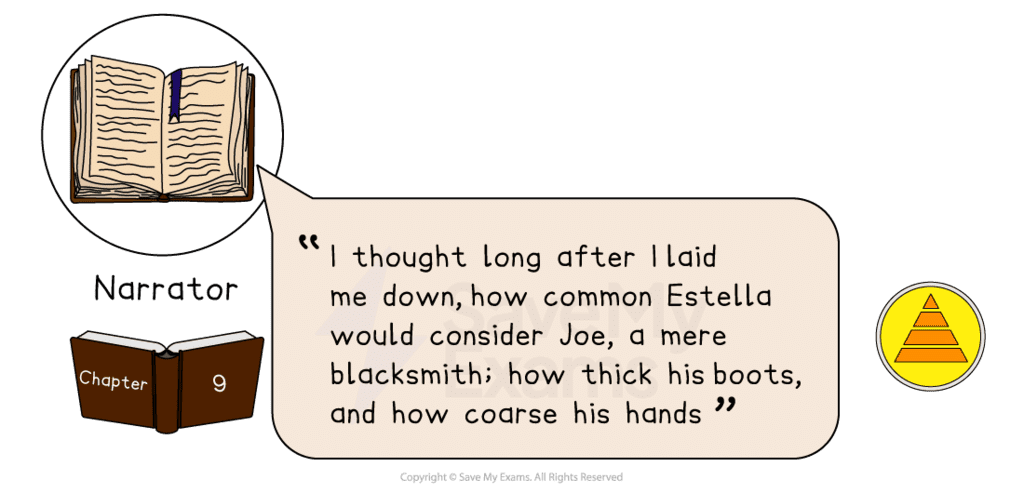
Analysis of Pip's Perception in Great Expectations
- Pip's Perception of Opposites: In the text, Pip's inclination to view the world in binary terms becomes apparent. This is illustrated when Joe's attire, behavior, and way of speaking clash with the elegance and sophistication associated with Satis House.
- Example: Despite Joe's genuine nature, Pip starts to judge him harshly through Estella's snobbish perspective, rather than relying on his own judgment.
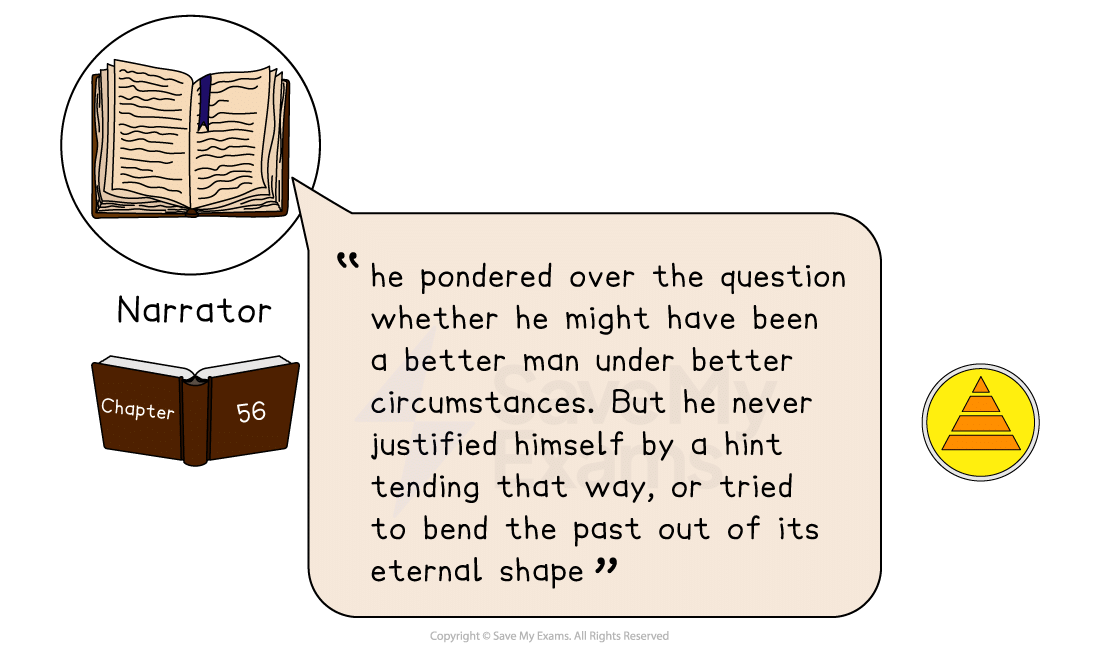
"He pondered over the question whether he might have been a better man under better circumstances. But, he never justified himself by a hint tending that way, or tried to bend the past out of its eternal shape" - Pip the narrator, Chapter 56
Reflecting on his life choices, Pip considers if different circumstances could have led him to be a different person. However, he refuses to make excuses or distort the past to ease his conscience.
Meaning and Context
- This quote is from Chapter 56, where Pip visits Magwitch in prison.
Analysis
- The character of Magwitch evokes a great deal of empathy from readers, and his death marks his complete redemption.
- His harsh upbringing partly explains his descent into a life of crime, suggesting that under better circumstances, he might have been a different person.
- Charles Dickens portrays Magwitch as a man who has endured severe social injustices, and the quote underscores his acknowledgment and acceptance of his past actions.
Understanding Pip's Transformation in "Great Expectations" |
|---|
|
Key Quotation Analysis |
|
Interpretation and Significance |
|
| Paraphrasing Great Expectations Quote |
|---|
Throughout the narrative, Pip's journey symbolizes the complexities of social mobility and the intrinsic value of integrity over superficial status. |
| Analysis of the Quote |
In essence, Dickens uses Pip's narrative arc to explore themes of identity, morality, and the intrinsic worth of individuals beyond societal labels. |
| Visual Representation |
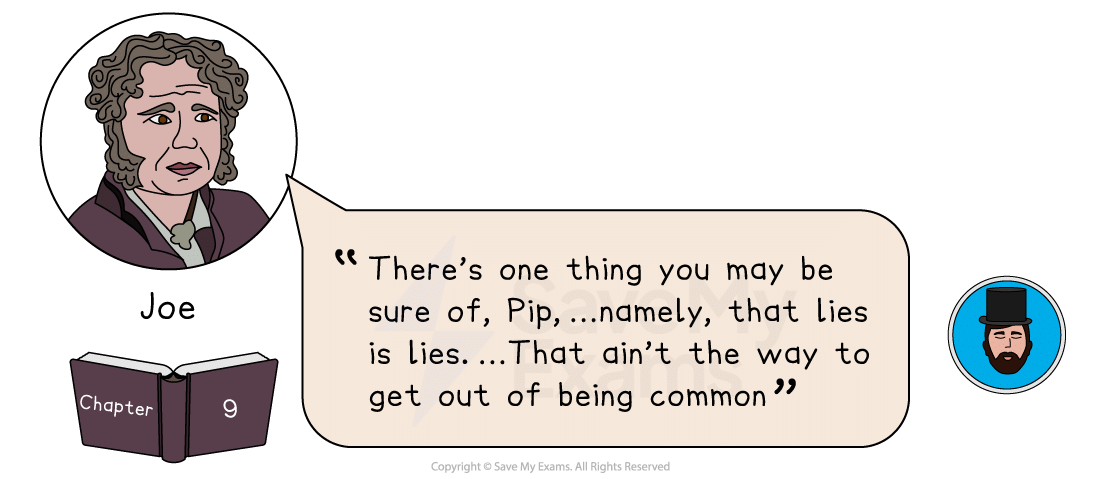 |
- Quote by Joe in Chapter 9:
"There’s one thing you may be sure of, Pip, … namely, that lies is lies. …That ain’t the way to get out of being common." - Joe, Chapter 9 - Meaning and Context:
- This quote is spoken by Joe to Pip in Chapter 9 after Pip admits to lying about an incident at Satis House.
- Analysis:
- Joe's words highlight his simple, honest, and virtuous character.
- Joe serves as a moral compass for Pip and the other characters in the novel.
Aiming for Quality over Quantity in Referencing
- Avoid focusing on the quantity of references and instead prioritize the quality.
- It is not necessary to adhere to a specific number of references, but it is recommended to make 2-3 thoughtful, detailed, and well-considered references that are closely tied to the question at hand.
- Having a smaller number of references that are well-developed is more advantageous than having a larger number of brief and underdeveloped references.
Download Notes on Great Expectations: Key Quotations
Paraphrased Explanation:
- Emphasize quality when referencing, focusing on depth rather than quantity.
- It's crucial to make 2-3 comprehensive references that are directly relevant to the question to score higher marks compared to making 6-7 superficial references.














